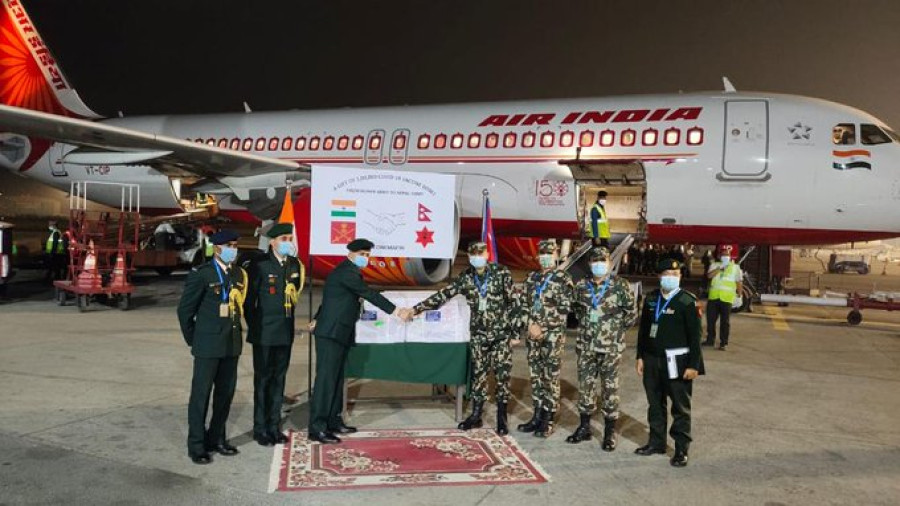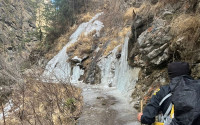National
Indian Army provides 100,000 doses of Covishield to Nepal Army
The jabs arrive at a time when Nepal is struggling to secure shots against Covid-19 to continue its vaccination drive. The Army says the vaccines will be used to inoculate its personnel and their dependents.
Arjun Poudel & Binod Ghimire
The Indian Army has provided 100,000 doses of Covid-19 vaccines to the Nepal Army.
The doses arrived in Kathmandu on Sunday evening.
The 100,000 doses of Covishield vaccine, developed by Oxford-AstraZeneca and locally manufactured by the Serum Institute of India, have come to Nepal at a time when the government has halted its vaccination drive for the lack of jabs.
“100,000 doses of #MadeInIndia Covid-19 vaccine gifted by Indian Army to the Nepali Army were received at Tribhuvan Airport today,” the Embassy of India wrote on Twitter on Sunday evening.
The vaccines received by the Nepal Army on Sunday, however, are said to be meant for the Nepal Army, and not the general populace.
Brigadier General Santosh Ballave Poudyal, spokesperson for the Nepali Army, said that the jabs received on Sunday were provided by the Indian Army.
“We have received the consignment of 100,000 doses of vaccine is a good gesture from the Indian Army,” Poudyal told the Post. “This will be used to vaccinate Nepal Army personnel and their dependants.”
The vaccines from India, courtesy the Indian Army, have arrived at a time when India has halted exports of Covishield to meet its demand at home as infections have been rising.
The move is expected to affect Nepal’s vaccination drive which was launched on January 27 after India provided 1 million doses under grant assistance. Nepal then signed a deal, in February, to buy 2 million doses of the vaccine, of which only one million doses have arrived so far. There is no clarity yet on when the Serum Institute will provide the remaining one million doses to Nepal.
Nepal’s plan to buy another 5 million doses from the Serum Institute has been in limbo, as the world’s largest manufacturer of the vaccine has not responded yet.
Nepal currently has around 500,000 doses of vaccines, just enough to give the booster shots to those 438,000 people who took the first jabs between January 27 and March 5. These people will be given their second doses from April 20 to April 24.
In the second phase, from March 7 to March 15, around 1.35 million were administered the first dose of the vaccine. They should be taking the second shots May 16 onwards. But Nepal currently lacks vaccines for that.
Nepal has also received 348,000 doses of vaccine from COVAX, a programme backed by the World Health Organisation, under which 20 percent of the 30 million Nepalis will be vaccinated. For that, COVAX is supposed to provide around 13 million doses.
However, with India putting a ban on exports of AstraZeneca vaccine, there are concerns if Nepal would receive the said number of doses on time.
UNICEF, however, said on Saturday that COVAX expects that the Serum Institute of India will resume full deliveries of the AstraZeneca shots to it in May, according to Reuters.
“Deliveries of SII/AZ vaccine are expected to begin fully again by May, with catch-up deliveries to reach every participant’s full allocation up to May, accelerating thereafter,” a UNICEF spokeswoman told Reuters in an email.
UNICEF is the distributing partner of the programme, run with the GAVI vaccine alliance.
According to Reuters, the UNICEF spokeswoman said that COVAX was in talks with New Delhi to secure “some supply” in April too.
COVAX was expecting a total of 90 million doses from SII in March and April, of which it has received about 28 million.
Nepal’s defence force which has a total strength of 96,000 personnel, currently has around 88,000 working.
Poudyal said the Army personnel who have got the first doses will be getting the second shots from those received on Sunday.
Around 20,000 army staff had received the jabs in the first phase. “The remaining will be used to vaccinate those who haven’t got yet. If there is spare, the dependents of the army staff will get them,” he said.
Dr Samir Kumar Adhikari, joint spokesperson for the Health Ministry, refused to comment on the vaccines that the Indian Army provided to the Nepal Army.
Officials at the Ministry of Health said that they had information about the vaccine the Indian Army was providing to the Nepal Army.
“Yes, we knew about the vaccines being provided to the Nepal Army by the Indian Army,” an official at the Health ministry told the Post asking not to be named. “But it won’t be wise to comment on this issue now.”
The armies of Nepal and India share a “brotherly” relationship for ages. Chiefs of both the armies are considered, in reciprocity, the Chief of Army Staff.
Every chief of the Nepal Army is conferred with the title of the honorary general of the Indian Army, and the same happens with the chief of the Indian Army.




 10.83°C Kathmandu
10.83°C Kathmandu














